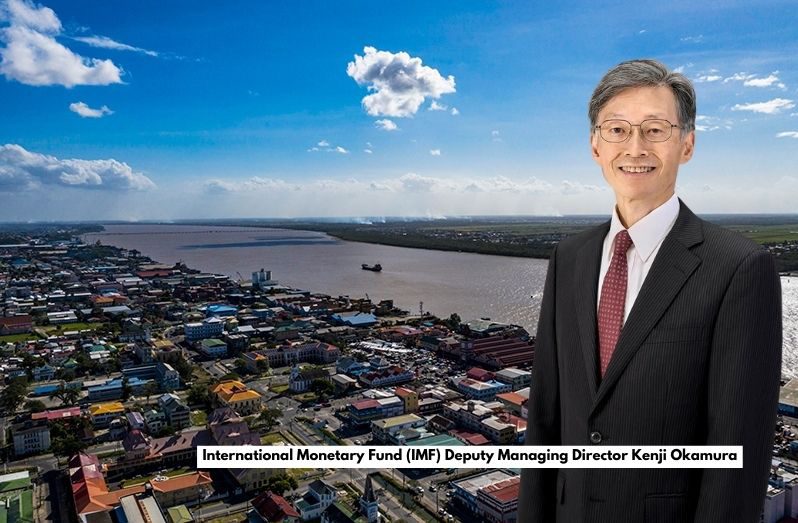AS Guyana stands on the cusp of transformative growth, International Monetary Fund (IMF) Deputy Managing Director, Kenji Okamura, has praised the nation’s economic strides, while highlighting the need for balanced development and macroeconomic stability.
Okamura was on a high-level two-day visit to Guyana, where he examined several ongoing projects to get a first-hand view of the nationwide transformative growth taking place under the People’s Progressive Party/Civic (PPP/C) Government.
“Notwithstanding the recent economic boom, Guyana still faces significant human and infrastructural development needs. I strongly support the authorities’ efforts to improve economic welfare through public investment, while avoiding the non-trivial risk of economic overheating,” Okamura said at the conclusion of his visit.
Guyana’s leadership, including President Irfaan Ali; Vice President Bharrat Jagdeo, and Senior Minister with Responsibility for Finance, Dr. Ashni Singh, engaged in discussions with the IMF team, showcasing ongoing projects and development strategies.
The meetings highlighted the government’s commitment to leveraging the country’s oil revenues for public infrastructure and social services enhancement.
In February, while approving the historic $1.146 trillion budget to deliver accelerated improvement to the lives of Guyanese and development, the National Assembly also approved the Fiscal Enactments Bill.
Dr. Singh elaborated on the Fiscal Enactments Bill, designed to balance immediate withdrawals and long-term savings from the National Resource Fund (NRF), and highlighted its role in amending the NRF Act of 2021 to support public infrastructure and social services development.
He outlined objectives to optimise the financing mix, ensuring a balance between immediate withdrawals and long-term savings from the NRF.
The passage of the 2024 budget and the Fiscal Enactments Bill paves the way for a continuation of zero per cent excise tax on petroleum, costing the government an estimated $40 billion annually to mitigate global fuel price volatility and extended pre-pandemic freight charge adjustments until December 31, 2024, at a cost of over $6 billion to combat increased shipping costs.
The 2024 budget provisions include substantial allocations for small business development, skill enhancement, food price stabilisation, and health initiatives, alongside significant tax reliefs and benefits aimed at boosting household incomes and supporting vulnerable groups.
These measures align with the government’s strategy to foster economic growth while addressing inflation and promoting sustainable development.
The World Bank’s “Global Economic Prospects” report forecasts remarkable growth for Guyana, with the economy expected to significantly outperform its Caribbean counterparts.
The forecast predicts an astounding 38.2 per cent growth in 2024 and 15.2 per cent in 2025 for Guyana, the highest in the Caribbean.
This growth is underpinned by burgeoning oil production, anticipated to reach around 550,000 barrels per day with the Payara field’s operation.
Moreover, sectors like agriculture and construction are expected to bolster non-oil GDP growth, with the IMF previously estimating a 38.4 per cent GDP growth in 2023 and non-oil real GDP growth exceeding nine per cent.
Looking ahead, Guyana is poised for a robust growth trajectory, driven by private investments in oil, gas, and service industries, and substantial public capital spending, primarily funded by oil revenue transfers.
The IMF projects that the economy will double by 2028, with sustained non-oil GDP growth at 5.5 per cent as the government continues addressing developmental needs.
Minister Singh, in his presentation of the Fiscal Enactments Bill, said: “The PPP/C Government will maintain its transparent and accountable management of the oil and gas sector and of the economy as a whole, including by maintaining strict fiscal discipline, strategic vision, and economic stewardship that will ensure that the funds will be used for financing investments that will reap high dividends for current and future generations.”
The government’s expansionary fiscal policy, balanced by monetary policy, is deemed appropriate by the IMF, considering the nation’s developmental necessities.
This approach, coupled with measures introduced in 2022 and 2023, has contributed to a decline in the inflation rate, as noted in ECLAC’s Preliminary Overview of the Economies of Latin America and the Caribbean 2023 report.
Overall, Guyana’s economic landscape is set for continued expansion, with growth averaging 20 per cent expected annually from 2024 to 2028.




.jpg)









